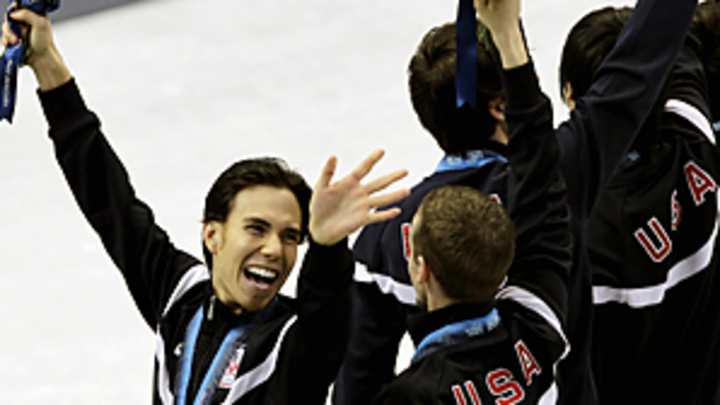Record night proves to be just a snapshot of Ohno's entire career

Ohno, 27, wasn't quite ready to say that he's heading into retirement from speedskating after winning his eighth Olympic medal in the 5,0000-meter relay Friday night. The prospect of competing in the 2014 Games in Sochi, Russia, is still in play. "I think I'm always going to be involved in short track in in some way shape or form," he said. "If you're asking me if I'll compete in Sochi, I have no idea. I never say never. But I need a break from this sport. It's been very good to me."
Even though he wouldn't make it official, the talk was mostly past tense after Ohno's eventful evening. With more medals than any other U.S. Winter Olympian in history, his legacy seems complete. And Friday's performance seemed if not a perfect ending, then at least a fitting one, in keeping with dramatic way his career has unfolded.
Ohno has always been accepting of the seemingly random twists of fate that can make or break a speedskater on the short track. Those breaks have fallen in his favor at times and against him at others, and Friday night, which ended with him being disqualified in the 500-meter final and winning a bronze medal in the 5,000-meter relay, was no different.
In the first two heats of the 500, opponents fell to the ice in front of Ohno, who picked his way through the wreckage to qualify for the for the final. But, once there, yet another opponent went down and this time the ruling was that Ohno had caused the fall with subtle but significant contact, and he was disqualified despite having crossed the finish in second place. The gold went to CharlesHamelin, delighting his Canadian countrymen.
He was disappointed with the 500 result, but as always, philosophical. "Whether I think it was the right decision is irrelevant," he said. "It's something that's out of my control."
In other words, no regrets. If he's leaving, he leaves with without any of them, having grown into a great Olympian and more importantly, a mature man after a childhood in which, by his own admission, he came close to falling in with the wrong crowd. If he cannot be called the greatest American speedskater of all-time -- both Eric Heiden and Bonnie Blair won more golds than Ohno's pair -- at least give him this: no U.S. skater has had a wider career arc.
In any great drama, the main character has to change, evolved, and Ohno has certainly done that. He has gone from the rebellious teenager who skipped out on training without his father Yuki's knowledge to the mature man so dedicated to his sport that he re-shaped his body in preparation for these Games. He brought a trainer to live with him in Salt Lake City and oversee his nearly maniacal training, and diet regimen, which trimmed his 5-foot-8 frame down to 142 pounds, 25 lighter than he was at his first Olympics in 2002, and dropped his body fat, he said, to around three percent. Not bad for a guy who was nicknamed 'Chunky' as a kid. "I didn't want to look back and have any regrets," he said, sounding the theme again. "I wanted to do everything possible in case this was the last time."
He was serious about being the best, but that doesn't mean Ohno didn't have fun. He had plenty of that. He embraced celebrity with both arms, going Hollywood without reservation. He danced a mean rhumba to win Dancing with the Stars, he did talk shows, he was named one of People magazine's 50 sexiest people. He didn't mind becoming a recognizable figure beyond speed skating with his trademark bandana and soul patch.
Yet Ohno handled those potential distractions amazingly well. His coach, JimmyJang, expected his edge to have been dulled after his Dancing with the Stars experience in 2007. Instead, Jang was astonished to see in Ohno's first workouts that he was fit enough and sharp enough to compete immediately. The trappings of fame didn't deter him, and neither did the pressure of becoming the face of his sport. Ohno brought speed skating back into the public consciousness after Heiden, Blair and DanJanssen, which is one of the reasons he seems to be the rare star who doesn't engender any resentment by his lesser-known teammates and opponents. "I'm just thrilled to be a part of his history," said JordanMalone, a member of the relay team. "He's such a great and generous skater that it's a privilege to be his teammate."
Every American speedskater owes Ohno a debt, but he has also come to realize what he owes to others, as well. That's part of maturation, realizing that it's not all about you. In recent years he has expressed more gratitude toward his father, with whom he clashed at times as a young man. A single father, Yuki drove his son countless miles to various competitions as Apolo grew up in Seattle. But in those early days young Ohno had a chip on his shoulder, and who knows how much of that was due to the absence of his mother, who left the family when he was a toddler? When he talks philosophically about the randomness of speed skating, about referees' decisions that he cannot control, could he be applying the lessons learned from dealing with his mother's departure?
It's all part of Ohno's growth, a process that will continue whether or not he ever laces up his skates again. But if this is the end of the skating chapter, it ends with Ohno feeling much more at peace than when he began. "I feel totally happy, totally at peace with what this team accomplished," he said. "I couldn't be more satisfied." He was talking about one evening, but he could have been referring to his entire career.
